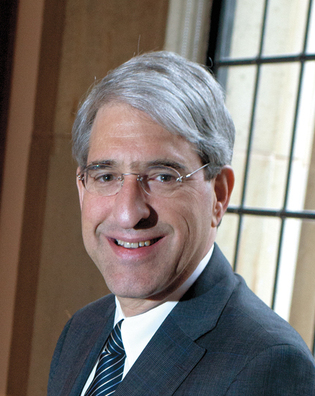 loading
loading
Q&A: Peter SaloveyBusiness planThe president talks about creating jobs in New Haven. Kathrin Lassila ’81 is editor of the Yale Alumni Magazine.  Mark OstowView full imageY: In your inaugural address, you stressed adding jobs in New Haven. How do you plan to do that? S: One of the ways is to encourage Yale students who have entrepreneurial inclinations to develop and establish their companies here in New Haven. We have to look at the places our entrepreneurial students now go—Cambridge, Silicon Valley, New York—and ask what can we do here in New Haven that might motivate students to remain. That has to do with housing, incubator space, access to expertise—legal, accounting, venture capital, and the like. Y: And Yale has the Yale Entrepreneurial Institute. S: YEI helps students get started and develop their ideas, and pairs them with MBA students from SOM who help them think about the business side—marrying their creativity and entrepreneurship with business expertise. We could raise funds that provide a little start-up capital. One of the first seven-figure gifts that was pledged to Yale after I was announced as president was for an idea like this one. We know this is all possible because we already have good examples. Higher One, which provides financial services to colleges and universities and is now a major employer in New Haven, was started by three Yale students who rented space in New Haven, took over the old Winchester rifle factory, and are now listed publicly on NASDAQ. If that kind of company took root here every few years, imagine how it would change the economic climate in the city. Our faculty members also play a significant role. There are many faculty spin-off companies. Alexion, which is going to move downtown, was spun out of faculty laboratory research. Craig Crews, director of the Yale Center for Molecular Discovery, was just named “Entrepreneur of the Year” by Connecticut United for Research Excellence. Craig has two start-ups to his name: Proteolix, sold in 2009, and Arvinas, which employs 15 people at its Science Park headquarters. In the Yale School of Medicine, on Science Hill, and in the School of Engineering and Applied Science, faculty members are conducting research that has the potential to produce breakthroughs that could be commercialized. Our Office of Cooperative Research does a great job supporting those inclinations. Y: What about New Haven as a place to live? S: I’ve lived in New Haven for more than 30 years, so I know it’s a great place to live. But we need to develop our reputation as a place where students want to start their companies, begin their careers, and raise families. The city benefited for the last 20 years with the partnership of Mayor [John] DeStefano and Yale president [Richard] Levin [’74PhD]. That partnership will continue with the new mayor, Toni Harp [’78MEnvD], and myself. Among other important projects—working with the public schools and encouraging home ownership in New Haven—Yale has helped create an exciting retail climate around campus: local boutique and apparel shops, a couple of anchor tenants, restaurants of quite high quality at various prices. Bruce Alexander [’65, a Yale vice president] has done an admirable job developing Yale’s properties and making Yale an excellent neighbor downtown. The cultural scene—not just the Yale museums and concerts, but also local dining, music, and theater—has added to that mix. We also have a thriving residential scene, with new apartments and condos downtown. In fact, New Haven’s rental occupancy rate is consistently among the highest in the nation. This city has never been more vibrant or livable in my three decades here.
The comment period has expired.
|
|